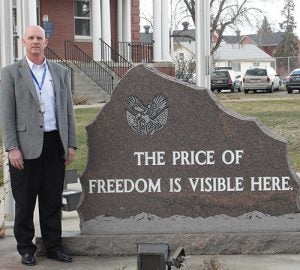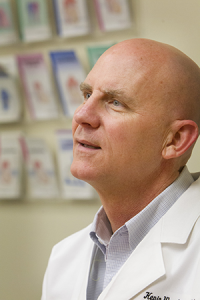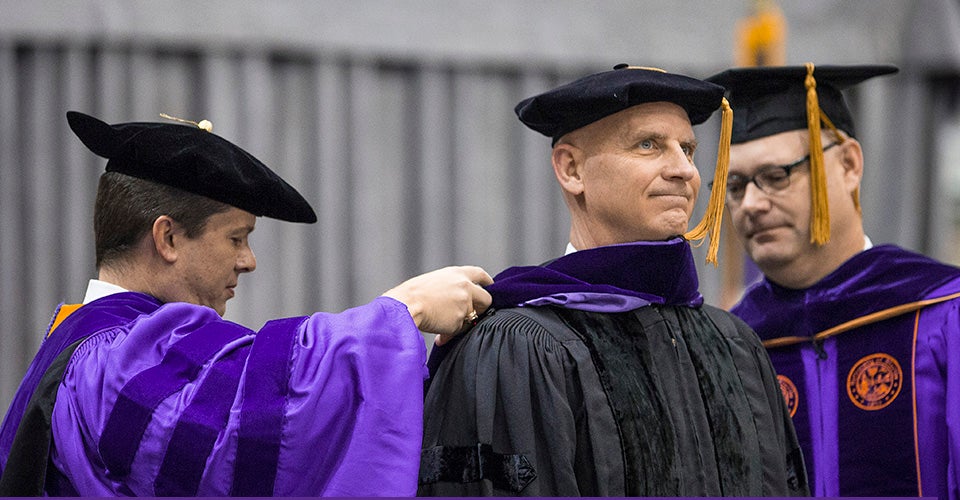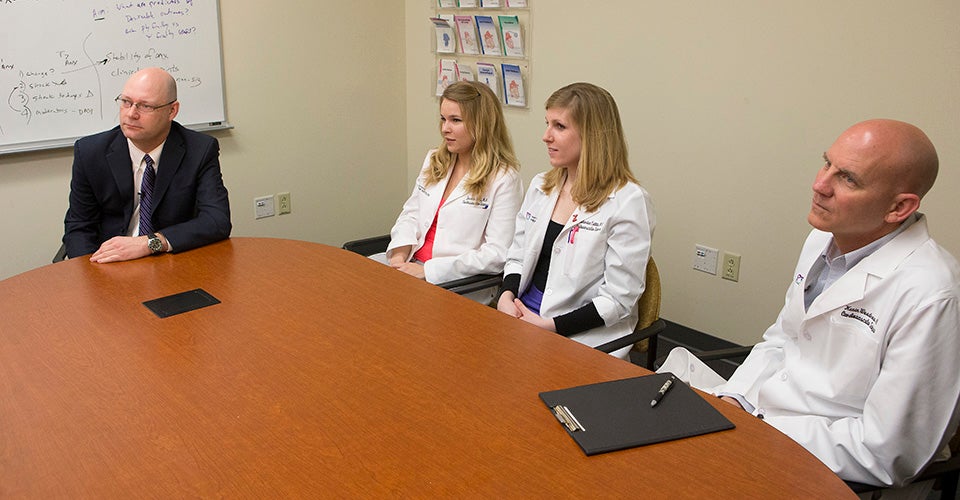FULL CIRCLE
Kevin Woodrow served active duty for the U.S. Army during significant international conflicts. Now, he’s helping other veterans face and win some of the toughest battles of their lives.
Woodrow, who officially accepted his doctoral degree in clinical health psychology at East Carolina University’s Dec. 18 commencement ceremony, is already working as a graduate psychologist for the Sheridan VA Medical Center in Sheridan, Wyoming. He works with veterans in a residential substance-abuse treatment program as they work to overcome their mental-health challenges and make the transition to more successful lives.

Woodrow stands by a plaque at the entrance of the Sheridan VA Medical Center in Sheridan, Wyoming, where he works as a graduate psychologist helping veterans in a substance-abuse treatment program. (Contributed photo)
“When I was in the Army, even during rough days, I always liked the fact that I was part of an important mission,” Woodrow said. “I feel that way working in the field of psychology as well. Helping veterans who are struggling with mental-health issues is very meaningful.”
Woodrow’s career with the Army spanned 20 years, including active tours during Desert Storm and Operation Iraqi Freedom. He took a position working in the Army ROTC department at ECU and earned an online master’s degree in psychology. He considered applying for ECU’s doctoral program in clinical health psychology, and he enrolled in the program upon his retirement.
“It was almost my last chance to go for it,” Woodrow said. “I was doing something I had thought about for a long time.”
The program was a natural fit for Woodrow, who found the faculty “supportive, knowledgeable, and professional,” he said. He and his fellow students felt that their professors and mentors were rooting for their success throughout the challenging course work and program requirements.
“They wanted us to do well,” he said. “There is a spirit of collaboration that is quite evident, and the faculty have expertise in diverse fields in health psychology.”
The graduates have secured equally diverse positions in clinical health psychology arenas. Woodrow interned for the VA—the largest employer of health psychologists, he said—at the Sheridan hospital, which proved to be the right fit for him long term.
As he served with allegiance to his country, Woodrow also feels a similar camaraderie with the fellow veterans in the substance-abuse program. He draws upon his own experiences in the Army to form bonds with the veterans, what he calls a “therapeutic alliance.” That connection between Woodrow and the patients builds a level of trust as he learns about the mental and physical challenges they face.
He works with veterans in group settings but also addresses individual cases, helping the veterans manage their substance-abuse problems and assisting them as they make decisions including where they will live, what their next steps in life will be and how to succeed at long-term recovery and manage and cope with additional health problems.
Former classmate Jessica Ford said Woodrow’s military service would lend itself to his profession.
“I’m excited to learn that he is going to work with veterans in his future,” she said. “He has the patience to help people who are dealing with the varied and complex issues our veterans face.”

Graduate psychologist Kevin Woodrow spoke about his experiences at the Department of Psychology’s upcoming graduation.
“I think that quiet patience and his excellent listening skills are his best quality as a therapist,” she said, “will be immensely helpful to veterans who just need someone to turn and talk to—someone in their corner who will listen.”
Woodrow’s path from doctoral student to psychologist is a testament to ECU’s mission of service, said Sam Sears, director of ECU’s doctoral program in health psychology and Woodrow’s mentor.
“Kevin Woodrow represents the best of service to his country and to its citizens,” Sears said. “Here is a guy that doubled down on service: 20-plus years in the military and now training and service to persons dealing with psychological difficulties.”
Sears said Woodrow is an asset to the field and to his patients.
“It is hard to imagine anyone with more of a heart for service,” Sears said. “He is truly a remarkable man who lives out the best of values.”
Woodrow will share his story with fellow graduates in the Department of Psychology as the department’s graduation speaker. He hopes his story can “encourage someone else,” he said. “ECU has been great to me.”
Woodrow’s speech will liken professional psychological duties to the framework the students have set during their tenure at ECU. He will tell fellow graduates that the preparation they have received as students will serve them at the highest levels of their careers as well.
“The skills, knowledge and perseverance we’ve benefited from in college are the same things that will help us after graduation,” Woodrow said.
A Texas native, Woodrow retired from the Army as a major, and balances his career with spending time with his wife and three children.
After meeting the rigorous demands of the doctoral program and while addressing the challenges of his patients, Woodrow appreciates the moments when his career choice is validated.
“Invariably, they come when it becomes quite evident that one of my patients has benefited from our work together,” he said. “I think, ‘Yes, this is right. This is a good place to be.’”

